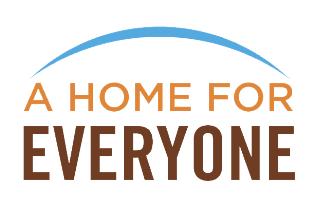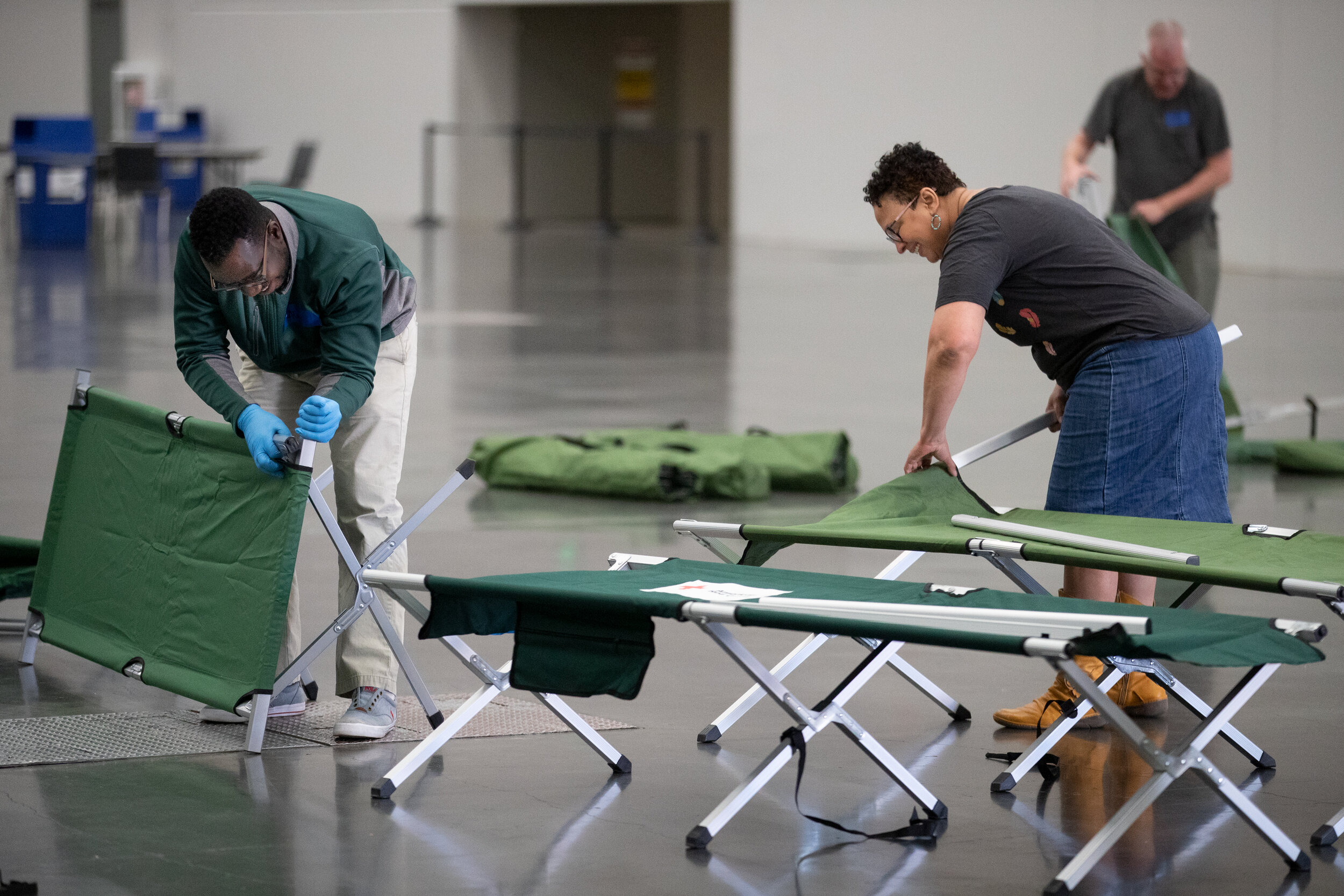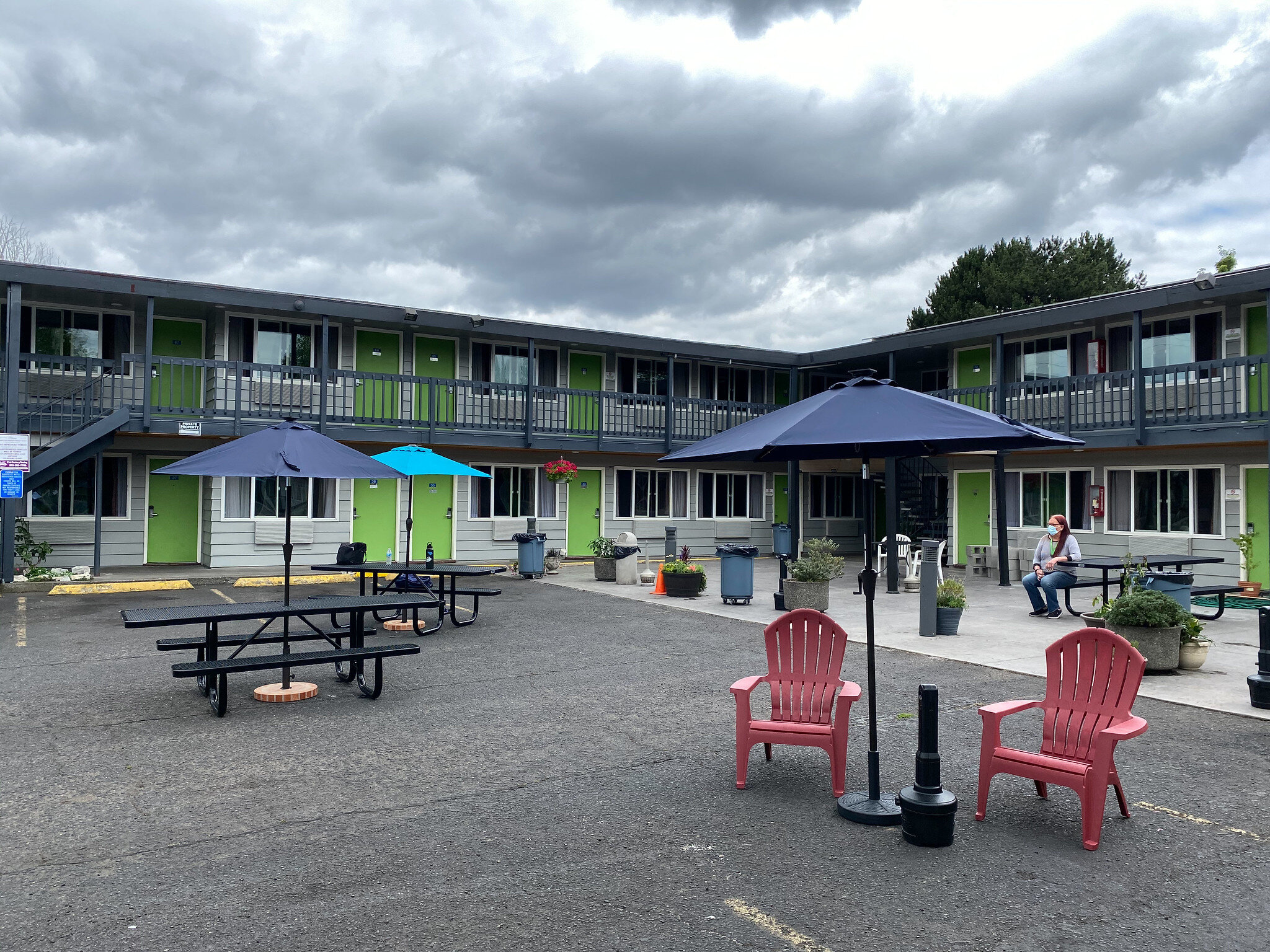Updated Feb. 2, 2021
Supporting people experiencing homelessness during the COVID-19 crisis
One of our community’s greatest responsibilities during the COVID-19 crisis is to look out for our neighbors who are particularly put at risk for the virus.
The Joint Office of Homeless Services — which brings together Multnomah County, the City of Portland and numerous social service agencies — has taken direct, swift actions to limit the spread of COVID-19 to and among people experiencing homelessness by working on shelter and outreach solutions. Other community partners are taking action, too, increasing hygiene options in the community.
That work includes:
Opening motel shelters for vulnerable people.
Creating physical distancing throughout the shelter system.
Distributing water, meals, face coverings and other gear to people camping through expanded street outreach.
Creating outdoor emergency shelters.
Funding thousands of meals a week through contracts with food providers.
Placing portable bathrooms and toilets throughout the community.
During a March 17 press conference, Tri-County Health Officer Dr. Jennifer Vines shared that a major communicable disease event, like the COVID-19 emergency, shines a spotlight on numerous “crises within the crisis,” including issues like housing instability and food insecurity. The Joint Office works every day to support community members experiencing these hardships, but COVID-19 sharpens the picture of how these difficulties intersect, overlap and compound barriers to wellness and security.
Nowhere is that demonstrated more clearly than in the heightened vulnerability to COVID-19 that people living in shelters or outside experience.
In order to provide the support people experiencing homelessness need during this unprecedented emergency, the Joint Office and its partners have taken the following measures:
The motel shelter operated by Transition Projects at the Banfield Value Inn.
Moving Shelter Beds, Increasing Safety
EXTENDING WINTER SHELTERS: On March 11, after Multnomah County and Portland declared states of emergency, adult winter shelters were ordered to remain open instead of closing in spring as scheduled. That kept dozens of people inside and created immediate space to spread out shelter beds.
EXPANDING MOTEL VOUCHERS: The Joint Office authorized shelters to implement a limited expansion in the use of motel vouchers to ensure shelter residents who were at higher risk of experiencing complications from the virus, including people over 60 and with certain underlying health conditions, could access safer accommodations.
EVICTION MORATORIUM: Portland and Multnomah County ordered a moratorium on residential evictions. The moratorium ensures that more people are not thrust into homelessness, or unstable housing, during or because of COVID-19 and its impact on wages and income.
TEMPORARY PHYSICAL DISTANCING SHELTERS (FIRST PHASE)
Working quickly with Portland Parks and Recreation and Metro, the Joint Office and Multnomah County’s emergency operations center opened shelters on March 20 in two high-profile public buildings — the Charles Jordan Community Center and the Oregon Convention Center. The 240 beds between the two temporary shelter spaces do not add new capacity, but do allow the system to maintain the total number of beds while practicing safe social distance. More than 220 County workers have signed up for shifts at the temporary shelters.
The East Portland Community Center, also owned by Portland Parks & Recreation, opened March 30 as a women-only shelter to further aid in maintaining shelter capacity while upholding safety measures.
The Mt. Scott Community Center opened, as of April 6, as an indoor-only shelter space helping spread out existing beds. Because so many sites have been added to spread out beds, privately funded shelter providers such as CityTeam and Right 2 Dream Too have also been able to space out their programs by shifting people to these new spaces.
PHYSICAL DISTANCING MOTEL SHELTERS (CURRENT PHASE)
Staring in June, with case counts rising again in Multnomah County, the Joint Office and the County’s Emergency Operations Center began winding down operations at the temporary emergency shelters and replacing them with shelters operating at motels. There will be six motel-based shelters total.
Motels offer safer shelter for vulnerable people by providing individual rooms and bathrooms, while still allowing traditional shelter services such as housing navigation, wellness support, and case management.
Beds at motel shelters are reserved for people across the shelter system assessed as having the highest risk of dying or having serious symptoms from COVID-19. That includes people who are older or who have underlying health conditions. Public health guidance has called for better separation and isolation options for people at high risk in congregate settings.
On June 3, the first such transition began. Women assessed as high risk moved into a shelter program created at the 50-room Chestnut Tree Inn in east Portland. That program replaces the shelter operating at the East Portland Community Center. Human Solutions is operating that shelter.
In July, three additional motels opened as shelters, with rooms leased by the Joint Office. The 53-room Banfield Value Inn, serving adults from all genders, is operated by Transition Projects. Do Good Multnomah, serving as operator, is sheltering adults of all genders at a 43-room Motel 6 and at a 59-room Days Inn. Those three sites replaced temporary shelters at the Mt. Scott and Charles Jordan community centers.
In October, a fifth motel shelter opened in North Portland. the Urban League of Portland — working in partnership with the Joint Office — opened a shelter specifically designed for Black adults who face increased risks from COVID-19. The Jamii Program offers 43 units of temporary shelter for adults in a safe and socially distanced program designed to maximize success for Black people.
This month, a sixth motel shelter is scheduled to open in Southwest Portland, completing the transition to motels for vulnerable people. With the two final motel shelters in hand, temporary shelter at the Oregon Convention Center will close.
VOLUNTARY ISOLATION MOTELS: The Jupiter Hotel stepped forward and offered the Joint Office and Multnomah County all 81 of its rooms to give people in shelters who develop respiratory symptoms a place to isolate away from a congregate setting, helping to limit the spread of COVID-19 among vulnerable groups. A second motel program has also opened in east Portland. Overall, there are 120 rooms available.
WINTER SHELTERS: Winter shelters for 2020-21 will be open 24 hours because COVID-19. A former winter shelter that’s been open all year, the Walnut Park shelter, will also shift to 24-hour operations. This year’s spaces will be in buildings available, in part, because of the pandemic. Two of the spaces are in community centers that had been used temporarily as physical distancing shelters. Because of the transition to motels for vulnerable people, those spaces were ready to accommodate others without shelter for the winter.
Charles Jordan Community Center; 100 beds, operated by Do Good Multnomah
Mt. Scott Community Center; 75 beds, operated by Joint Office staff
Former Greyhound station in Old Town; 100 beds, operated by Transition Projects.
OUTDOOR EMERGENCY SHELTERS: The City of Portland, working with JOIN and nonprofit partners such as Right 2 Dream Too, Sisters of the Road and Street Roots and others, have created three outdoor emergency shelters that will host 30 to 33 tents each and provide multiple restrooms and handwashing stations, as well as access to meals. Click here to read about winterization efforts. The sites (on SE Water and Main, SE Water and Salmon and NW Broadway and Glisan) opened in April.
Meal Assistance and Food Access
SUPPORTING MEAL PREP AND DISTRIBUTION: The Joint Office approved $260,000 a month as part of an emergency contract with Catholic Charities and Blanchet House to support the preparation and distribution of 10,000 meals a week at Blanchet House and the St. Francis Dining Hall.
SOCIAL DISTANCING SHELTER MEALS: The Joint Office and Multnomah County’s Emergency Operations Center are working with Stone Soup, a restaurant and vocational training program, to provide hundreds of meals a day at the four social distancing shelters and two motel shelters that have opened because of COVID-19. Stone Soup is coordinating with community partners and several local restaurants.
EXPANDING REACH OF FOOD ACCESS RESOURCES: As part of its Food Disbursement Pilot Project, the Joint Office — working with outreach partners including Urban League, the interagency Navigation Team, Northwest Enforcement, Project Respond, First United Ministry of Christ, Portland Street Medicine, Rapid Response, Rahab’s Sisters, and the Homelessness and Urban Camping Impact Reduction Program (HUCIRP) — distributed more than 28,000 sack lunches paired with water between April 29 and Aug. 6. Work delivering food and water is happening weekdays.
The program is designed to bring food and water directly to people outside the downtown core and central city, so they don’t have to travel as far for necessities.
The agencies coordinating to help provide and source these lunches include:
Catholic Charities of Oregon
Blanchet House
Plate & Pitchfork
Lincoln High School families
Our Lady of the Lake Catholic Church
Salvation Army
Additional groups of community members
street Outreach, supplies and Education
HOSTING A SUPPLY DEPOT: The Joint Office provided sanitizer and hundreds of masks to shelters and outreach teams. The Joint Office is staffing a supply depot that service providers, whether funded by the County or not, can access. If you have questions about supplies, email [email protected].
COUNTYWIDE OUTREACH MISSION: The Joint Office coordinated a days-long, countywide outreach initiative that reached more than 2,500 people in every corner of the County. The teams distributed outdoor gear, sanitizer and bedding.
INFORMATION CARDS: The Joint Office and Public Health also worked with service providers and experts to create and distribute a laminated information card on COVID-19 for people experiencing homelessness. Outreach workers, shelters, day spaces and other programs have distributed thousands of copies since March 11.
SEVERE WEATHER SUPPLIES: The Joint Office has supplied its contracted outreach providers with enhanced cold weather kits (tents, tarps, sleeping bags, hand warmers, clothing, masks) for use when cold or severe weather events are declared. Each severe weather shelter and Voluntary Isolation Motel (VIMo) Shelter has been supplied with a large set of warming kits to provide in situations where someone may refuse to access a congregate shelter. Additional pods with supplies have been set up at the Sunrise Center for outreach in East County. These supplies are incorporated into the totals below.
DIRECTLY PROVIDING SUPPLIES: Outreach teams have been able to distribute the following amounts of gear with Joint Office funding since late March 2020. That work continues every day. Here’s a cumulative snapshot as of Jan. 21, 2021:
Blankets: more than 22,000
Sleeping bags: more than 11,750
Mylar Emergency Sleeping bags: more than 6,600
Tarps: More than 26,500
Tents: 11,750
Emergency mats: 350
Socks: 45,000 pairs
Water (gallons): 167 pallets
Water (bottles, 24-pack, 16 fl. oz.): 132 pallets
Electrolyte packets: more than 3,800
Powerade: 438 gallons (donation)
Metro trash bags: more than 6,770
Can openers: 1,500
Cell phones: 77
Toilet Tents: 13
Hygiene kits: 72,000
Double-sink hand-washing stations: 20
Portable toilets with hand-washing stations: 23, with 100 more on the way
Insect repellant: 2,000 cans
Hand sanitizer (gallons): 730
Hand sanitizer (individual size): 28,570 bottles
Sanitizing wipes: 68,120 wipes
Baby wipes: 8,720 containers
Face coverings (3-ply masks, cloth face coverings): more than 45,000
Masks (KN95): more than 314,000
Thermometers (individual and infrared): 216
Boxes of nitrile gloves (50-150 pairs each): more than 3,100
Dog food: 350 lbs
Cat food: 150 lbs
Hand warmers: more than 16,150
Ponchos: 16,000
First-aid kits: 30
Feminine hygiene products: 4,500 boxes
Condoms: more than 4,000
Dental dams: 200
Lubricant: 200 tubes
Flashlights: 1,200
Gauze rolls: 3,460
Gauze pads: 4,160
Band aids: 28 cases (1,500 ea)
Antibiotic ointment: 36,000 individual packets
Sunscreen: 4,000 individual packets
Meal supplement shakes: 330 (donation)
Cooling towels: 3,000
Underwear: 10,000
Hoodies: 3,000
Sweat pants: 3,000
Warming gloves: 4,000
Warming hats: 4,000
Socks: 45,000 pairs
Thousands of informational fliers including:
"COVID-19 information cards" in English & Spanish (laminated)
"HUCIRP COVID-19 Phase 1 Protocol" flier in English & Spanish (water-resistant)
"Needle Exchange Schedule” flier
"Digital Rose City Resource Guide" flier
“Know your rights” flier from ACLU
“How to apply sanitizer & use disposable masks” flier
COMMUNITY PARTNERSHIPS, EMPOWERING VOLUNTEERS: Since April 7, the following organizations, agencies and community partners — many of whom have not traditionally been funded by the Joint Office — have received gear from the Joint Office to distribute:
Do Good Multnomah
New Avenues for Youth
Rapid Response Bio Clean
Janus Youth Services
Central City Concern
Multnomah County Sheriff’s Office’s HOPE Team
Human Solutions
Oregon Harbor of Hope
Ecumenical Ministries of Oregon HIV Day Center
Urban League of Portland
CityTeam
Union Gospel Mission
Portland People's Outreach Project
Outside In
Catholic Charities of Oregon
Miracles Club Clean & Sober
Cascadia Behavioral Healthcare
Transition Projects
Sisters of the Road
Northwest Enforcement (Central Eastside Together)
Native American Rehabilitation Association (NARA)
Native American Youth & Family Center (NAYA)
Integrated Health Clinics
Right 2 Dream Too
Free on the Outside
City of Portland’s Homeless and Urban Camping Impact Reduction Program
Providence Health (BOB Program)
Salvation Army
Multnomah County Mental Health & Addiction Services
Clackamas Service Center
Rose Haven
Grassroots/community community volunteers in St. Johns
Project Respond
PDX Trans Housing Coalition
First United Ministry of Christ
Rahab’s Sisters
Multnomah County Corrections
Portland Street Medicine
Joint Office-funded domestic violence shelters and service providers (Bradley Angle, Raphael House, Gresham Women's Shelter, VOA, Unica)
Free Hot Soup, which has re-distributed some of their supplies to these groups:
Free Lunch Collective
Food Not Bombs
Various small grassroots groups organizing on social media
Portland Parks and Recreation
Portland Fire and Rescue (Street Response / CHAT)
Home Forward
Blanchet House
St. Johns Safelight
Portland Rescue Mission
Agape Village
Multnomah Intensive Treatment Team (MITT)
Multnomah County Health Assessment and Treatment (HAT) Team
Straightway Services
Potluck in the Park
AfroVillages PDX
Terras International Counseling
Cascadia Woodland Park Health Center
Iron Tribe Network
DCJs Diversion Court Staff
Homeplate Youth Services
Rockwood CDC, which re-distributes their supplies to these agencies:
Wallace Medical
Kaiser Permanente’s low-income families who already receive other wraparound services
Black Community Partners'
Rosewood Initiative’s families that center around 162nd and Stark
Outgrowing Hunger
Play Grow Learn
DEVELOPING GUIDANCE: Counseled by community-based organizations, the Joint Office worked with the County’s Public Health Division to produce comprehensive guidance for shelters and for people who are unsheltered.
PUBLIC HEALTH COORDINATION: Weekly (formerly twice a week), the Joint Office brings together dozens of service providers for check-in calls where they can ask for direct guidance from Public Health, ask other questions and compare notes.
PROVIDER RESOURCE PAGE: The Joint Office is also curating a resource page at ahomeforeveryone.net where service providers can share updates on how their programs are changing because of COVID-19.
Hygiene Services, trash pickup and Cleanups
TRASH PICKUP CONTINUES: Trash service and biohazard cleanups are continuing at the direction of the city’s One Point of Contact.
PORTABLE RESTROOMS: The City has worked to swiftly increase hygiene options for people experiencing homelessness without shelter. The Homelessness and Urban Camping Impact Reduction Program (HUCIRP) has placed 22 portable toilets, including interior handwashing stations, at strategic locations throughout the community.
PORTABLE HANDWASHING STATIONS: HUCIRP has also placed 23 standalone handwashing stations at locations throughout the community.
PARKS BATHROOMS OPEN: Parks and Recreation has ordered park bathrooms across the city to remain open 24/7 during this emergency.
HYGIENE INFORMATION: The City is maintaining an interactive map of each type of hygiene facility.
CAMP CLEANUP CHANGES: There is not an outright moratorium on cleanups, but HUCIRP has increased the threshold for campsite cleanups. HUCIRP is also doing all it can to prevent collecting personal property and having folks move. To require a camp to move, or to collect personal property, sites must pose a very significant public health and safety risk, or those camping must be set up in the middle of a street or next to fast moving traffic (like on a highway on/off ramp). HUCIRP is working with campers to help sites achieve spacing, support cleaning and improve sanitation.


